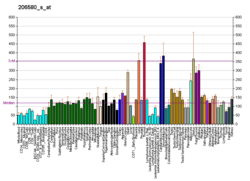EFEMP2
| EFEMP2 | |||||||||||||||||
|---|---|---|---|---|---|---|---|---|---|---|---|---|---|---|---|---|---|
| |||||||||||||||||
| Identifiers | |||||||||||||||||
| Aliases | EFEMP2, ARCL1B, FBLN4, MBP1, UPH1, EGF containing fibulin like extracellular matrix protein 2 | ||||||||||||||||
| External IDs | MGI: 1891209 HomoloGene: 32339 GeneCards: EFEMP2 | ||||||||||||||||
| |||||||||||||||||
| RNA expression pattern | |||||||||||||||||
  | |||||||||||||||||
| More reference expression data | |||||||||||||||||
| Orthologs | |||||||||||||||||
| Species | Human | Mouse | |||||||||||||||
| Entrez | |||||||||||||||||
| Ensembl | |||||||||||||||||
| UniProt | |||||||||||||||||
| RefSeq (mRNA) | |||||||||||||||||
| RefSeq (protein) | |||||||||||||||||
| Location (UCSC) | Chr 11: 65.87 – 65.87 Mb | Chr 19: 5.47 – 5.48 Mb | |||||||||||||||
| PubMed search | [1] | [2] | |||||||||||||||
| Wikidata | |||||||||||||||||
| |||||||||||||||||
EGF-containing fibulin-like extracellular matrix protein 2 is a protein that in humans is encoded by the EFEMP2 gene.[3][4][5]
A large number of extracellular matrix proteins have been found to contain variations of the epidermal growth factor (EGF) domain and have been implicated in functions as diverse as blood coagulation, activation of complement and determination of cell fate during development. EFEMP2 (also known as fibulin-4) contains four EGF2 domains and six calcium-binding EGF2 domains. This gene is widely expressed in a range of adult and fetal tissues.[5]
Interactions
EFEMP2 has been shown to interact with P53.[6]
References
- ↑ "Human PubMed Reference:".
- ↑ "Mouse PubMed Reference:".
- ↑ Giltay R, Timpl R, Kostka G (Feb 2000). "Sequence, recombinant expression and tissue localization of two novel extracellular matrix proteins, fibulin-3 and fibulin-4". Matrix Biol. 18 (5): 469–80. PMID 10601734. doi:10.1016/S0945-053X(99)00038-4.
- ↑ Katsanis N, Venable S, Smith JR, Lupski JR (Sep 2000). "Isolation of a paralog of the Doyne honeycomb retinal dystrophy gene from the multiple retinopathy critical region on 11q13". Hum Genet. 106 (1): 66–72. PMID 10982184. doi:10.1007/s004390051011.
- 1 2 "Entrez Gene: EFEMP2 EGF-containing fibulin-like extracellular matrix protein 2".
- ↑ Gallagher, W M; Argentini M; Sierra V; Bracco L; Debussche L; Conseiller E (Jun 1999). "MBP1: a novel mutant p53-specific protein partner with oncogenic properties". Oncogene. ENGLAND. 18 (24): 3608–16. ISSN 0950-9232. PMID 10380882. doi:10.1038/sj.onc.1202937.
Further reading
- Gallagher WM, Argentini M, Sierra V, et al. (1999). "MBP1: a novel mutant p53-specific protein partner with oncogenic properties.". Oncogene. 18 (24): 3608–16. PMID 10380882. doi:10.1038/sj.onc.1202937.
- Gallagher WM, Greene LM, Ryan MP, et al. (2001). "Human fibulin-4: analysis of its biosynthetic processing and mRNA expression in normal and tumour tissues.". FEBS Lett. 489 (1): 59–66. PMID 11231014. doi:10.1016/S0014-5793(00)02389-9.
- Wistow G, Bernstein SL, Wyatt MK, et al. (2002). "Expressed sequence tag analysis of human retina for the NEIBank Project: retbindin, an abundant, novel retinal cDNA and alternative splicing of other retina-preferred gene transcripts.". Mol. Vis. 8: 196–204. PMID 12107411.
- Strausberg RL, Feingold EA, Grouse LH, et al. (2003). "Generation and initial analysis of more than 15,000 full-length human and mouse cDNA sequences.". Proc. Natl. Acad. Sci. U.S.A. 99 (26): 16899–903. PMC 139241
 . PMID 12477932. doi:10.1073/pnas.242603899.
. PMID 12477932. doi:10.1073/pnas.242603899. - Clark HF, Gurney AL, Abaya E, et al. (2003). "The secreted protein discovery initiative (SPDI), a large-scale effort to identify novel human secreted and transmembrane proteins: a bioinformatics assessment.". Genome Res. 13 (10): 2265–70. PMC 403697
 . PMID 12975309. doi:10.1101/gr.1293003.
. PMID 12975309. doi:10.1101/gr.1293003. - Ota T, Suzuki Y, Nishikawa T, et al. (2004). "Complete sequencing and characterization of 21,243 full-length human cDNAs.". Nat. Genet. 36 (1): 40–5. PMID 14702039. doi:10.1038/ng1285.
- Gerhard DS, Wagner L, Feingold EA, et al. (2004). "The status, quality, and expansion of the NIH full-length cDNA project: the Mammalian Gene Collection (MGC).". Genome Res. 14 (10B): 2121–7. PMC 528928
 . PMID 15489334. doi:10.1101/gr.2596504.
. PMID 15489334. doi:10.1101/gr.2596504. - Rual JF, Venkatesan K, Hao T, et al. (2005). "Towards a proteome-scale map of the human protein-protein interaction network.". Nature. 437 (7062): 1173–8. PMID 16189514. doi:10.1038/nature04209.
- Otsuki T, Ota T, Nishikawa T, et al. (2007). "Signal sequence and keyword trap in silico for selection of full-length human cDNAs encoding secretion or membrane proteins from oligo-capped cDNA libraries.". DNA Res. 12 (2): 117–26. PMID 16303743. doi:10.1093/dnares/12.2.117.
- Xiang Y, Sekine T, Nakamura H, et al. (2006). "Fibulin-4 is a target of autoimmunity predominantly in patients with osteoarthritis.". J. Immunol. 176 (5): 3196–204. PMID 16493080. doi:10.4049/jimmunol.176.5.3196.
- Taylor TD, Noguchi H, Totoki Y, et al. (2006). "Human chromosome 11 DNA sequence and analysis including novel gene identification.". Nature. 440 (7083): 497–500. PMID 16554811. doi:10.1038/nature04632.
- Hucthagowder V, Sausgruber N, Kim KH, et al. (2006). "Fibulin-4: a novel gene for an autosomal recessive cutis laxa syndrome.". Am. J. Hum. Genet. 78 (6): 1075–80. PMC 1474103
 . PMID 16685658. doi:10.1086/504304.
. PMID 16685658. doi:10.1086/504304. - El-Hallous E, Sasaki T, Hubmacher D, et al. (2007). "Fibrillin-1 interactions with fibulins depend on the first hybrid domain and provide an adaptor function to tropoelastin.". J. Biol. Chem. 282 (12): 8935–46. PMID 17255108. doi:10.1074/jbc.M608204200.
External links
This article is issued from
Wikipedia.
The text is licensed under Creative Commons - Attribution - Sharealike.
Additional terms may apply for the media files.